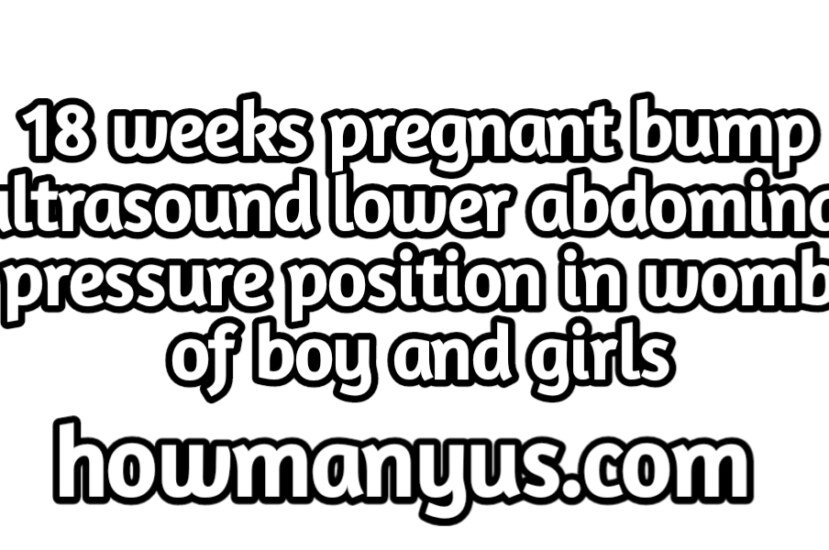18 weeks pregnant bump
At 18 weeks pregnant, you may start to notice a small baby bump, although the size and appearance of the bump can vary greatly depending on factors such as your body type and the position of the baby. Generally, the uterus is starting to rise up out of the pelvis and expand, so your bump may become more noticeable. Read here more one post for about more info…. How many week pregnant am i

It’s important to keep in mind that every pregnancy is different, so some women may have a noticeable bump earlier or later than others. If you have any concerns about your pregnancy or the size of your bump, it’s always a good idea to check in with your healthcare provider.
Where is baby located at 18 weeks
At 18 weeks, the baby is located inside the uterus, which is now expanding and rising out of the pelvis. The baby is growing rapidly and is approximately 5.5 inches (14 cm) long and weighs about 6.7 ounces (190 grams). The baby is still small enough to have plenty of room to move around in the uterus, and you may start to feel its movements for the first time around this time.
The baby’s head is still relatively large compared to its body, and its facial features are becoming more defined. The baby’s bones are also starting to harden, and its muscles are getting stronger. The placenta is continuing to develop, providing the baby with oxygen and nutrients, and the amniotic fluid is increasing to cushion and protect the baby as it grows.
18 week pregnancy ultrasound
At 18 weeks pregnant, an ultrasound can provide a lot of information about the development of your baby. Here are some of the things you can expect to see:
- Your baby’s size: At 18 weeks, your baby is about 5 1/2 inches long (head to bottom) and weighs around 7 ounces.
- Baby’s movements: Your baby will likely be moving around a lot during the ultrasound, and you may even be able to see some of these movements.
- Heartbeat: The ultrasound will show your baby’s heart beating, which is usually around 140 to 150 beats per minute.
- Organs: The ultrasound will give your doctor a good view of your baby’s major organs, including the brain, kidneys, and liver.
- Placenta and amniotic fluid: The ultrasound can show how much amniotic fluid is around your baby, as well as the position of the placenta.
- Gender: At 18 weeks, it may be possible to tell your baby’s gender, but this can vary depending on the position of the baby.
Overall, the 18-week ultrasound is an important milestone in your pregnancy and can provide reassurance that your baby is developing as expected. Your doctor will be able to discuss the results of the ultrasound with you in detail.
See the 18 weeks pregnancy ultrasound video
18 weeks pregnant symptoms of boy
There is no definitive list of symptoms that can accurately predict the sex of a baby during pregnancy. While some people believe that certain symptoms may indicate the gender of the baby, there is no scientific evidence to support this.
However, at 18 weeks pregnant, you may experience some common pregnancy symptoms, regardless of the sex of the baby. These can include:
- Fatigue: You may feel more tired than usual, as your body is working hard to support the growing baby.
- Nausea and vomiting: Some women experience morning sickness during the first trimester, but it can continue into the second trimester for some.
- Increased appetite and food cravings: As your body works to nourish the growing baby, you may find yourself feeling hungry more often or craving certain foods.
- Mood swings: Hormonal changes can cause mood swings and emotional ups and downs during pregnancy.
- Round ligament pain: As the uterus expands, you may experience some mild cramping or discomfort in the lower abdomen.
Remember, the symptoms you experience during pregnancy are not a reliable way to determine the sex of your baby. The only way to know the sex of your baby for certain is through a medical test, such as an ultrasound or genetic testing.
18 weeks pregnant symptoms of girl
There is no reliable scientific evidence to suggest that the symptoms of pregnancy can accurately predict the sex of a baby. However, some people believe that there may be certain symptoms that are more common during pregnancy with a girl. These may include:
- Nausea and vomiting: Some studies suggest that women carrying girls may experience more severe morning sickness than those carrying boys, although this is not a reliable way to predict the sex of the baby.
- Acne: Some people believe that pregnancy with a girl can lead to more acne breakouts than pregnancy with a boy, although this is not supported by scientific evidence.
- Carrying high: It is often said that women carrying girls tend to carry high, with the baby bump sitting above the belly button, although this is not a reliable way to determine the sex of the baby.
- Mood swings: Hormonal changes during pregnancy can cause mood swings and emotional ups and downs, regardless of the sex of the baby.
Remember, the symptoms you experience during pregnancy are not a reliable way to determine the sex of your baby. The only way to know the sex of your baby for certain is through a medical test, such as an ultrasound or genetic testing.
How do I know my baby is OK at 18 weeks?
At 18 weeks pregnant, your baby is growing and developing rapidly, and it’s natural to have concerns about their health and well-being. Here are some signs that your baby is likely doing well:
- Fetal movement: By 18 weeks, you may start to feel your baby’s movements, which can be reassuring. If you haven’t felt any movement yet, it’s normal, but you should discuss this with your healthcare provider.
- Prenatal care: Attending regular prenatal check-ups with your healthcare provider can help to ensure that your baby is developing normally. Your healthcare provider will monitor your baby’s growth, check for any abnormalities, and offer advice and support.
- Healthy diet and lifestyle: Eating a healthy diet, staying hydrated, getting enough rest, and avoiding smoking, alcohol, and drugs can all help to support your baby’s growth and development.
- Ultrasound: Your healthcare provider may recommend an ultrasound at 18-20 weeks to check on your baby’s growth and development, and to screen for any potential problems.
If you have any concerns about your baby’s health or development, don’t hesitate to discuss these with your healthcare provider. They can offer advice and support, and may recommend further tests or referrals to specialists if necessary.
Is 18 weeks considered 5 months pregnant?
At 18 weeks pregnant, you are in your fourth month of pregnancy. Pregnancy is typically measured in weeks, rather than months, and there are approximately 40 weeks in a full-term pregnancy. However, it’s common to refer to pregnancy in terms of months as well, so at 18 weeks, some people may consider themselves to be 5 months pregnant.
To be more precise, if you count the months from the date of your last menstrual period (LMP), you would be at the beginning of your fifth month at 18 weeks pregnant. So, technically speaking, you are in the fifth month of your pregnancy, but still in the second trimester. It’s important to keep in mind that every pregnancy is different, and the way that pregnancy is measured can vary depending on cultural or medical practices.
18 weeks pregnant baby position in womb
At 18 weeks pregnant, the baby is typically positioned inside the uterus, surrounded by amniotic fluid. The baby is still relatively small and has plenty of space to move around, so their position can vary. Some common positions for the baby at 18 weeks include:
- Head down: At this stage, it’s unlikely that the baby will be in a head-down position yet, as this usually happens later in pregnancy.
- Transverse: The baby may be lying sideways across the uterus, with their head on one side and their feet on the other.
- Breech: In some cases, the baby may be positioned with their head up and their feet down, known as a breech position. However, this is less common at 18 weeks and is more likely to happen later in pregnancy.
It’s important to note that the baby’s position at 18 weeks is not a cause for concern, as they still have plenty of time to move into the correct position for birth. Your healthcare provider will monitor the baby’s position during regular prenatal check-ups, and if they are not in the optimal position closer to your due date, they may recommend techniques to encourage the baby to turn, such as exercises or manual manipulation.
18 week pregnancy symptoms
At 18 weeks pregnant, you may experience a variety of symptoms as your body continues to adjust to the changes of pregnancy. Some common symptoms at this stage may include:
- Increased appetite: As your baby grows, you may find that you are more hungry than usual and need to eat more often.
- Weight gain: You may continue to gain weight as your baby grows, and may notice changes in your body shape and size.
- Fatigue: You may feel more tired than usual, particularly in the first and third trimesters of pregnancy.
- Backache: As your uterus expands, you may experience back pain or discomfort.
- Skin changes: You may notice changes to your skin, such as darkening of the skin around your nipples and on your face (known as melasma).
- Braxton Hicks contractions: You may experience mild, irregular contractions, which are known as Braxton Hicks contractions. These are a normal part of pregnancy, but if you experience severe or regular contractions, you should contact your healthcare provider.
- Constipation: The hormones of pregnancy can slow down digestion, which can lead to constipation.
- Heartburn: As your uterus expands, it can put pressure on your stomach, which can cause heartburn or acid reflux.
It’s important to remember that every pregnancy is different, and you may experience some or all of these symptoms, or none at all. If you have any concerns about your symptoms, or if you experience severe or persistent symptoms, you should contact your healthcare provider for advice and support.
18 weeks pregnant is how many months
At 18 weeks pregnant, you are approximately 4 months and 2 weeks pregnant. Pregnancy is typically measured in weeks, rather than months, but if you count the months from the first day of your last menstrual period (LMP), then you would be at the beginning of your fifth month. Keep in mind that pregnancy is divided into three trimesters, each lasting 3 months, so at 18 weeks pregnant, you are still in the second trimester.
18 weeks pregnant belly
At 18 weeks pregnant, your uterus has grown enough to be noticeable above your pubic bone, and you may have a visible baby bump. However, the size and shape of your belly can vary depending on your body type, the size of your baby, and other factors.
Some women may have a larger or more prominent belly at 18 weeks than others, while some may have a relatively small bump. It’s important to remember that every pregnancy is different, and there is no “right” way for your belly to look at this stage.
If you are concerned about the size or shape of your belly, or if you have other symptoms that worry you, it’s a good idea to talk to your healthcare provider. They can monitor your pregnancy and provide guidance and support to ensure that you and your baby are healthy.
18 weeks pregnant lower abdominal pressure
It’s not uncommon to experience some lower abdominal pressure during pregnancy, particularly as your uterus expands and your baby grows. At 18 weeks pregnant, your uterus is still relatively small, but it’s possible to feel some pressure or discomfort in your lower abdomen as your body adjusts to the changes of pregnancy.
However, if you are experiencing significant or persistent lower abdominal pressure, or if you have any other symptoms such as pain, bleeding, or contractions, it’s important to contact your healthcare provider. These could be signs of a more serious condition, such as preterm labor, a urinary tract infection, or other pregnancy-related complications.
Your healthcare provider can perform an examination to check on the health of you and your baby, and provide guidance and support to ensure a healthy pregnancy. It’s always better to err on the side of caution and seek medical attention if you have any concerns during pregnancy.
Conclusion: 18 weeks pregnant
At 18 weeks pregnant, you are approximately 4 months and 2 weeks into your pregnancy, and you are still in the second trimester. Your baby is now around 5.6 inches (14.2 cm) long and weighs approximately 6.7 ounces (190 grams). During this time, your baby is developing rapidly and may start to become more active, with movements that you can feel.
You may experience a variety of symptoms during the 18th week of pregnancy, including increased appetite, weight gain, fatigue, back pain, skin changes, Braxton Hicks contractions, constipation, and heartburn. While some of these symptoms are common and normal during pregnancy, it’s always a good idea to talk to your healthcare provider if you have any concerns or if you experience severe or persistent symptoms.
Overall, the 18th week of pregnancy is an important time for both you and your baby, and it’s important to take care of yourself and your growing baby by eating a healthy diet, staying active, and getting regular prenatal care.





Leave a comment